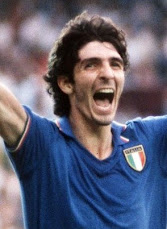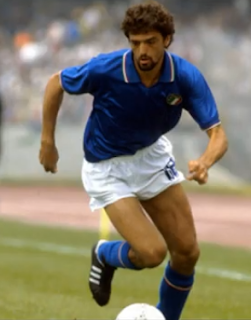Scored Italy’s third goal in 1982 Final
Alessandro Altobelli, one of only four players to score in a World Cup final after starting on the substitutes’ bench, was born on this day in 1955 in Sonnino, a small medieval town in mountainous southern Lazio.Alessandro Altobelli in action in one of
his 61 games for the Italy national team
At the age of 26, Altobelli was part of Enzo Bearzot’s squad for the 1982 World Cup finals in Spain, in which Italy triumphed for the first time since their two tournament victories under Vittorio Pozzo in the 1930s.
A striker with Internazionale of Milan, Altobelli did not start a single game in the 1982 finals and had played only a few minutes during Italy’s progress to the knock-out stages.
But he was called on after just seven minutes of the Final against West Germany, replacing Francesco Graziani, stricken with a shoulder injury, and his patience waiting for his chance was rewarded when he finished an Italian counter-attack with their third goal in the second half, giving the Azzurri a 3-0 lead that the Germans could not overcome.
Italy’s tournament hero, Paolo Rossi, had scored their opening goal before Marco Tardelli fired home their second, which he celebrated wildly in what became the enduring image of the tournament. Paul Breitner then scored for West Germany but the Italians by then looked unassailable.
The Italians had made a poor start to the tournament, scraping through the opening group phase, in which they drew all of their three games but progressed to the second phase only because they scored one more goal than outsiders Cameroon, who had an identical record.
 |
| Paolo Rossi was Italy's star in the 1982 finals |
They swept aside Poland in the semi-finals before proving too strong for the Germans in the final before a 90,000 crowd in the Santiago Bernabéu Stadium, Madrid.
Altobelli began his career with his local team, Latina, in Serie C - the third tier of the Italian football pyramid. He impressed enough in his debut season in the first team to earn a move to Brescia, who played in Serie B, where his form caught the eye of Serie A scouts. In 1977 he joined Inter.
It was at the San Siro, where Inter shared the famous Giuseppe Meazza Stadium with city rivals AC Milan, that his quality came to the fore. In 317 Serie A appearances, he scored 128 goals, finishing as Inter’s top scorer in nine of his 10 seasons. His 15 goals in the 1977-78 helped them win the scudetto - the Serie A title - for the 12th time.
In his time with Inter, Altobelli also won the Coppa Italia twice. He left in 1988 to join Juventus and finished his career back at Brescia. With almost 300 career goals in senior football, he is one of the top 10 most prolific strikers in Italian football history. His 56 goals in 93 games in the Coppa Italia remains the biggest tally for any player in the competition.
 |
| Altobelli today is a familiar face to television viewers |
His international career began in his third season with Inter, making his debut in the 1980 European championships, and he went on to make 61 appearances for the Azzurri, scoring 25 goals, captaining the side at Euro 1988.
After his retirement as a player, Altobelli had a brief career in politics, gaining election as a councillor in Brescia in 1991, representing the Christian Democrats, and made an unsuccessful attempt to be elected to the Chamber of Deputies in 1996.
By that time, he was back in football, both as a player - representing Italy at the world beach football championships - and in a management capacity as sporting director at Calcio Padova. He also acted as a scout for Inter.
More recently, he has been a regular television pundit, appearing on a number of popular shows.
Travel tip:A narrow street typical
of medieval Sonnino
Sonnino is a small hill town with many preserved medieval features in the Monti Lepini mountain range of southern Lazio, in the province of Latina. It is thought to have grown from an eighth century settlement established when inhabitants of the town of Priverno moved to higher ground to hide from invading Barbarians. Over the centuries it was controlled by several major Italian families, including the Borgias and Colonnas. Situated about an hour and 45 minutes’ journey from Rome to the north and a similar distance from Naples to the south, Sonnino’s elevated position offers spectacular views, while visitors can explore a network of steep, narrow streets.
Travel tip:Latina's Cattedrale di San
Marco was completed in 1933
To some, Latina, the capital of the province of the same name that includes Sonnino, serves as an ugly reminder of the dark days of Benito Mussolini’s Fascist dictatorship. To others, it stands as a monument to the architectural style that typified the era, which combined some elements of classicism, with its preponderance of columns and arches, with the stark lines of 1920s and 30s rationalism. The city itself owes its very existence to Mussolini, being built on land reclaimed when his government fulfilled its pledge to drain the inhospitable, mosquito-ridden Pontine Marshes to which visitors frequently became infected with malaria. Established in 1932 as Littoria - a name in itself associated with Fascist symbolism - it has a large number of monuments and edifices, including a town hall with a tall clock tower and a cathedral, designed by architects such as Marcello Piacentini and Angiolo Mazzoni. Renamed Latina in 1946, it has grown into a substantial city with a population of 126,000, making it the second largest city in Lazio after Rome.
Also on this day:
1873: The death of astronomer Caterina Scarpellini
1907: The birth of writer Alberto Moravia
1913: The birth of film music composer Mario Nascimbene
1941: The birth of actress Laura Antonelli
1977: The birth of 2006 World Cup hero Fabio Grosso














